Research
seikabutsu
Projects Outputs
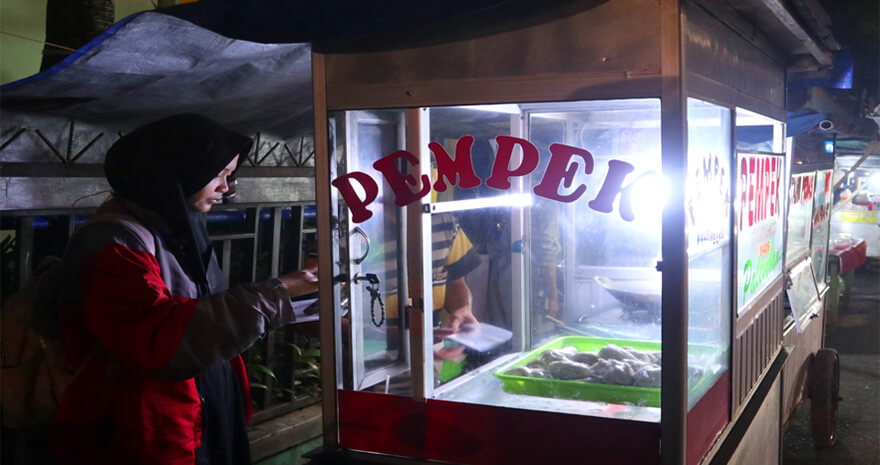
update:December 27, 2022

◉ Dinita Setyawati
Photo credit: Project representative
- Program
- 2019 Research Grant Program
- Project Title
- Energy Survival of the Marginalised: Case Study of Electric Charging Station for Urban Informal Sector in Jakarta and Bogor

- Representative
- Dinita Setyawati, Graduate School of Global Environmental Study, Kyoto University
Exploring the energy survival of street vendor communities in Indonesian cities of Bogor and Jakarta
Summary
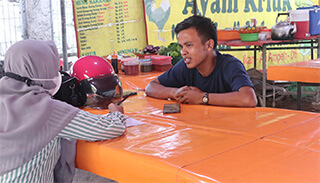
The project explores the energy survival of street vendor communities social in the electricity sector in terms of their electricity access, price and availability. In the project, marginalized urban communities are defined as the informal sector workers operating businesses on the street, or the street vendor communities. This project took place in the Indonesian cities of Jakarta and Bogor. The methodology is interviews, direct observation, participant-observation and documentation. Primary questions are: how and why ECS overcome distributional injustices in the electricity sector? What lessons are learnt and what are policy recommendations for the government? This project “Energy survival of the marginalised: case study of Electric Charging Station for urban informal sector” is aligned with the Indonesian government’s renewable energy commitment. At completion, this serves as important policy recommendations.
Background
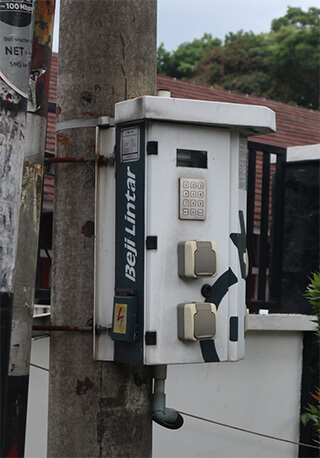
Historically, there is no legal electricity access provided by the government for street vendors operating on the street, for example for lamps, blending juices, or cooking with electric stoves. These small businesses most commonly use diesel power generators that generate air pollution containing toxic air contaminants, or they use cable connections from nearby houses. Recently, however, in 2016, the government of Indonesia developed Electricity Charging Stations (ECSs) located in public places, including parks and markets. An ECS gives the opportunity for anyone to buy online tokens and use electricity without having to apply for the complicated process of being a customer of the State Electricity Company of Indonesia in that particular location. The State Electricity Company of Indonesia holds the generation, transmission and distribution of electricity rights in accordance with Article 33 of the Indonesian Constitution where electricity is included as a natural resource.
Chapter XIV
The National Economy and Social Welfare
Article 33
(2) Sectors of production which are important for the country and affect the life of the people shall be under the powers of the State.
(3) The land, the waters and the natural resources within shall be under the powers of the State and shall be used to the greatest benefit of the people.
Energy justice campaign by the Government of Indonesia
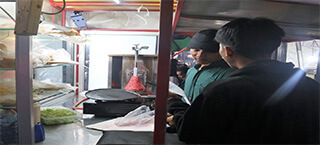
The people’s adapting to the regular use of ECS has been one of the government of Indonesia Energy Justice social campaign priorities since its establishment. This is the part of Energy Justice campaign proposed by the Government of Indonesia to ensure the availability, accessibility, and affordability of energy sources, mainly electricity and fuel for transportation.. Energy justice is also a strand of scholarship and defined by Professor Benjamin Sovacool in his book “Global Energy Justice: Problems, Principles and Practices” as a global energy system that equitably distributes costs and benefits and has fair and representative decision-making processes.
Ideally, justice pertains to the quality of being equal, righteous, and morally right. The moral principle determining just conduct is according to the rules of law or equity a system of justice in a given nation. However, justice is a relative term and involves different philosophical ideas depending on who defines it; the government’s definition of justice may be different from the communities’ definition of justice. The key is to identify what the communities perceive as injustices and bring the conclusion to the government in order to achieve the best possible solution. In examining the principles of energy justice, scholars have asked the following questions; What is reality? What is justice? What it is to be done?
In order to answer those questions, this project uses case study analysis to provide an answer through analysis of the situation (participant observation), determine what problems exist (in depth interview to reveal the communities’ perception of justice or injustices in regards to the facilities) and proposal of best possible policy to achieve justice in the energy system (interviews with government stakeholders).
Project findings
The project “Energy survival of the marginalised: case study of Electric Charging Station (ECS) for urban informal sector in Jakarta and Bogor” aims to reveal that surrounding communities near ECS generate a new sense of values that are solidarity, sustainability and tolerance. The facilities play a vital role in the social life of communities, it provides needed electricity for business activities. The social values of ECS lie in the contribution it makes to people’s attachment to their locality, communal presence, and solidarity with others who are using the facilities. Previously, the street vendors accessed electricity through illegal and unsustainable ways, through electricity theft or diesel generators. Some ECS facilities use solar panels which potentially may inform communities about the importance of renewable energy for the sustainability of future generations and the environment. It also has the potential to educate the communities the matters on carbon emission and non renewable versus renewable energy. Concerns and commitments to the current, next generation, and the environment are important elements in the sustainable development of society. ECS helps urban informal communities or street vendors to transition to a more sustainable society.
Electricity charging stations (ECS) are stand-alone power systems established to secure electricity services for street vendors across Indonesia. Before these stations were established, the vendors were dependent on an illegal connection, retrieving electricity from unauthorized extensions to the power lines from nearby houses. Moreover, street vendors have often operated illegally on the pavements for pedestrians. There were conflicts between urban authorities and these vendors regarding space for their activities. The development of ECS in designated parks and markets is partly aimed to address this issue by urging the vendors to move to such places.
From interviews with 28 street vendors operating in proximity to the electricity charging stations in Jakarta and Bogor, we find that the street vendors have difficulties accessing the needed electricity for their business. Around 70% said that they need to move places several times in order to look for places that have stable electricity connections. The electricity sources vary from emergency lamp, connection to nearby houses, diesel generators and electricity charging stations. Only four of the vendors we interviewed use ECS regularly, because their business is located quite close to the charging stations, and can use the socket as needed. We found that the vendors usually use less than 1 meter of cable connection to the charging stations.
In terms of mitigating the risk of distributional injustices or lack of electricity access in street vendors communities, it remains to be seen. It seems that more than half of the street vendors interviewed who operate close to ECS, do not have the knowledge that the facilities can provide electricity. The facilities are mostly used by the general public for charging their phones. Therefore, there needs to be more information dissemination efforts by the government, educating the vendors about the importance of ECS and its potential to use solar energy. It may also be that the COVID-19 pandemic impacted the use of facilities as the vendors who operate businesses before the pandemic close their stall, and there are new vendors in place. The electric charging stations was established in 2016, and it may be the case that the new vendors do not receive information about the facilities.
From the ten locations that we have observed, the city of Jakarta has five ECS, meanwhile, Bogor city has only installed two ECS in the designated places that we observed. For those who use the charging stations, we found that the facilities have become an integral part of the street vendors’ daily operations. In one location (Taman Bakti, Jakarta), the vendors bought electricity tokens collectively to use the ECS facility, indicating the formation of a community for energy. Electricity tokens are a document consisting of specific numbers to be inputted into the ECS to deliver a specified amount of electricity. In this case, the community shares the collective benefits of the energy project.
“We paid collectively about Rp. 200,000 (USD $18) per month. Before this facility was established, we used electricity from nearby houses and paid more.
Despite some of the facilities use of solar panels to generate electricity, the energy sources are not common knowledge among street vendors. Only one person from 38 respondents understand about solar panel and solar energy, indicating low awareness of low carbon energy matters.
I do not know about renewable energy. I just use it (ECS facilities) and I only know about my everyday livelihood.
The establishment of ECS invites the participation of small communities in renewable energy utilisation. The facility also indicates that the government recognizes vulnerable communities are in need of energy access. Historically, the informal sector workers have been neglected in policymaking and wealth monitoring, this new development suggests a positive change in the government’s policies.
Before these stations were established, the vendors were dependent on an illegal connection, retrieving electricity from unauthorized extensions to the power lines from nearby houses. Moreover, the street vendors have often operated illegally on the pavements for pedestrians. There were conflicts between urban authorities and these vendors regarding space for their activities. The development of ECS in designated parks and markets is partly aimed to address this issue by urging the vendors to move to such places.
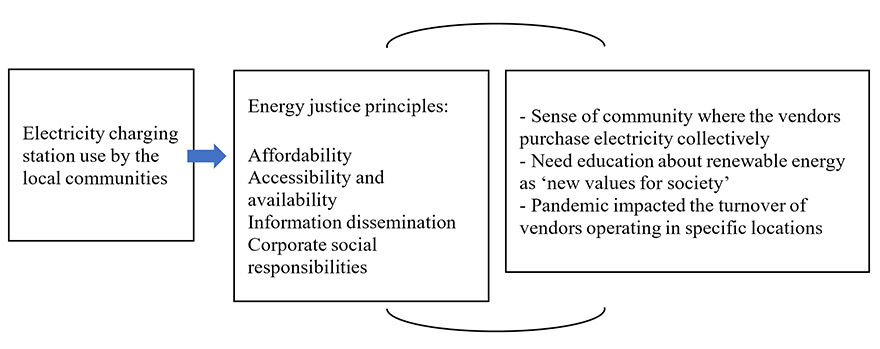
Figure 1 depicts the research result where the use of electricity charging stations confirmed the principles of energy justice: affordability, accessibility, and availability. We also found that the new values for society are a sense of community, or solidarity where the purchase of electricity was done collectively. However, renewable energy is not found to be a new value for society despite some of the stations using solar panels. Consequently, the government needs to educate street vendors more about the importance of solar panel and renewable energy to support cleaner living environment.
As for the understanding of justice by the street vendors, they understood justice as the quality of being equal. Their understanding also translates to the following components: accessibility of electricity, affordability of electricity, more information dissemination about electricity programs from the government. and corporate social responsibility programmes from energy companies for polluters pay responsibility. In line with the common understanding of justice by the Indonesian government, they think that injustices pertain to the price and affordability of energy products. The government’s electricity subsidy mechanism is one of the acceptable solutions from the government to ensure that all citizens receive equal access to electricity.

Conclusions, Implications and Distribution
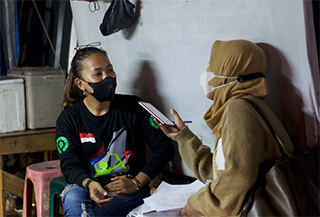
The project produced a documentary movie, an academic paper “Injustice and Environmental Harm in Extractive Industries and Solar Energy Policies in Indonesia” published on the International Journal for Crime, Justice and Social Democracy, and a talk show inviting the Ministry of Energy and Mineral Resources, the State Electricity Company of Indonesia, and the small business entrepreneur community Jakpreneur. In the talk show, the government representatives agree that renewable energy is important for Indonesia and important to be utilised not only in the rural areas but also in the urban areas where the population is denser. In fact, the government is promoting the use of solar panels and geothermal to accelerate the transition to a cleaner energy future. The utilisation of renewable energy in urban areas can be with solar panels that are installed on the roof of electricity charging stations. Meanwhile, geothermal can add renewable energy mix to the electricity grid. The community of entrepreneurs agreed that the use of cleaner energy can improve the quality of their businesses. It can also be an additional selling point to raise their product value and as a marketing strategy for the consumers. The implication of the policy is to increase the deployment of renewable energy and to educate the people about the importance of renewable energy to support better living conditions.
